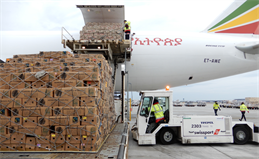
The volume of fresh flowers that Swissport is expected to handle is at its peak ahead of the Valentine's Day celebration on February 14, although lesser compared to last year's.
The ground handler said over 9,000 tons of love blossoms travel safely through its flower corridor, from the fields of the Kenyan highlands to Europe.
"Valentine's Day is approaching, and the global demand for fresh roses is at its peak," Swissport said.
It added that every week, 400 to 500 tons of cargo, 85% of which is fresh flowers, pass through Swissport's expansive 10,400 square meter cargo centre in Nairobi, Kenya.
This volume increases by 50%-55% in the run-up to Valentine's Day.
The facility — which is certified by IATA's CEIV Fresh — meticulously ensures the safe handling of general cargo, perishables, and temperature-sensitive goods, with a particular focus on flowers.
"Every year, Swissport successfully handles millions of fresh-cut flowers between January and February, aligning with peak demand during the Valentine's Day season, which begins in late January," said Edwin Musungu, head of cargo services at Swissport Nairobi.
"For the current year, we anticipate handling approximately 9,000 tons of flowers, a slight decrease from previous years attributed to aircraft capacity constraints, with carriers prioritizing the lucrative Chinese market due to the overlap with the Lunar New Year in 2024," he added.
Swissport noted that central to addressing this logistical challenge is Swissport's Flower Corridor initiative — a cold-chain innovation that has transformed the handling of fresh-cut flowers connecting Nairobi with key locations in Europe, such as Liege, Brussels, and Amsterdam, as well as markets in the Middle East and the Far East.
Swissport said its air cargo centres allow the speedy handling of perishables in a temperature-controlled environment with Etihad Airways, Turkish Airlines, British Airways, the airlines of the Lufthansa Group, China Southern, and Egypt Air, among its clients.
"It's not just about shortening handling times; it's about mitigating the risk of temperature impact on sensitive cargo," Musungu said.
"The primary objective is to ensure that every single rose arrives at its destination as fresh as the moment it was harvested, creating consumer happiness and improving the carbon footprint," he added.
Dirk Goovaerts, CEO of Swissport CEMEA and global cargo chair, said since the Flower Corridor was launched, Swissport has been working on perfecting the cold chain solution to provide high-quality services that protect the integrity of fragile flowers.
"We're excited about the future of air cargo handling in Kenya and are working with local cargo communities as we continue to enhance our solutions," he added.
Swissport pointed out that contrary to what many think, roses from Kenya have a smaller environmental impact than those grown in Europe, even when the carbon footprint of air transport is considered.
According to a study (Treeze, 2018) commissioned by Swiss retail group Migros-Genossenschafts-Bund, greenhouse gas emissions from fairtrade roses produced in Kenya were found to be four to six times lower, compared to roses grown in European greenhouses, with 6.5 times less energy required (air transport included).
"The climate in Africa is optimal for cultivating flowers, whereas recreating this environment in Europe often results in a significant carbon footprint," Swissport said in a statement.



